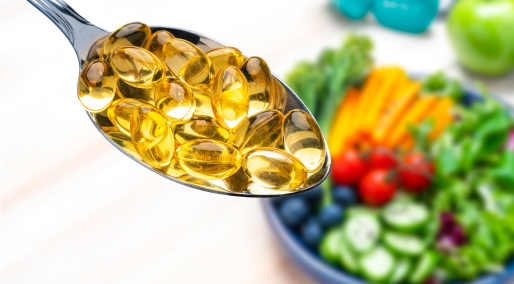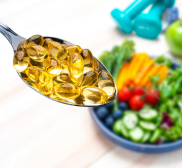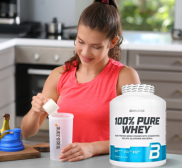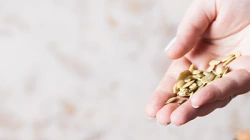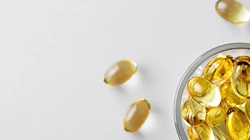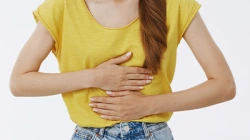.webp)
.webp)

Martyna Wiśniewska
Vitamin D - consequences of deficiency, properties, effects
VITAMIN D3
You have probably heard from your doctor, trainer or dietician that you should supplement with vitamin D, especially during the winter season, which is slowly approaching. Maybe you're skeptical about supplements, so you probably haven't taken the recommended medication. And that's a big mistake. This vitamin is very deficient in winter and is recommended by every specialist to check its level and, if there is a deficiency, to supplement the deficiencies.
Vitamin D3 is a chemical compound, cholecalciferol, produced in the skin under the influence of UV rays. Vitamin D2 is ergocalciferol, which comes from plant products. There is one more vitamin, vitamin D1, which is a mixture of cholecalciferol and lumisterol, but it is not active.
In Poland, we are struggling with a scientifically proven problem of widespread vitamin D deficiency. This is due to the fact that the angle of sunlight in winter does not allow for its proper production in the skin and the amount which is accumulated after the summer is usually insufficient.
WHAT IS VITAMIN D IN OUR BODY?
First of all, it is the guardian of your immunity, it allows you to increase the absorption of calcium and phosphorus in the digestive tract. How does this affect your bones? Imagine that you have a vitamin D deficiency, so your calcium metabolism is also disturbed. Calcium is needed not only in bones, but also in many metabolic processes. What's worse, with such a deficiency, the secretion of parathyroid hormone increases. The body, in order to remedy the situation, takes calcium from the bones to provide enough for metabolic processes, which leads to decalcification and reduced bone mineral density. Hello osteoporosis!
If this wasn't enough for you and you still think that supplementation is unnecessary, read the next few sentences. Often, diseases such as multiple sclerosis, rheumatoid arthritis, diabetes, or recurrent infections are associated with reduced levels of vitamin D. It is also noticeable that people with cancer are deficient in this vitamin.
Vitamin D also increases the incidence of autoimmune diseases, neuromuscular diseases, and dry eye syndrome. Deficiency of this vitamin causes rickets in children. However, elderly people suffering from neurodegenerative diseases such as Alzheimer's and Parkinson's are diagnosed with vitamin D deficiency.
If you are physically active and exercise at the gym, I hope this argument will appeal to you. Vitamin D affects muscle strength by increasing the number of type II fibers. In the results of research on this topic, researchers prove that appropriate supplementation is able to increase muscle strength by almost 20%. As an athlete with a vitamin D deficiency, you not only reduce your potential muscle strength, but also expose yourself to a greater risk of infection and injury.
HOW TO PROPERLY TEST YOUR VITAMIN D LEVEL
Of course, in the laboratory, but there are a few tests that may confuse you and you will wonder which one is better and why. Vitamin D3 and its metabolites can be tested from blood. Most often, unless otherwise recommended by a doctor, the 25-OH-D test is recommended. It is a relatively cheap test and covers both the level of vitamin D3 and D2. Sometimes, a doctor recommends 1.25-OH-D, but these are special tests that you should have prescribed by a specialist.
DEMAND FOR VITAMIN D — WHERE TO GET IT?
In the treatment of deficiencies, the dosage is slightly different. You should perform tests regularly, first checking the level of deficiency, then see a specialist for supplementation, and then after 3 months of supplementation, you can perform the test again to check whether the vitamin D level has increased.
Before I discuss the available products, I will tell you how to supplement so that swallowing pills does not go to waste. First of all, vitamin D must be taken with a fatty meal, you ask why? This is because this vitamin belongs to the ADEK group of vitamins, which are fat-soluble. So the vitamin eaten on an empty stomach or with a fat-free meal will simply not be absorbed. That's what. What's better, one fatty meal is not enough, vitamin D from supplements will not be absorbed if there is a deficiency of fats in the entire daily distribution. Remember appropriate and healthy fats in your diet, they are essential, don't be afraid of fat! :)
SUPPLEMENTS CONTAINING IT CONTAINS VITAMIN D3
JARROW FORMULAS Bone-Up 120 capsules
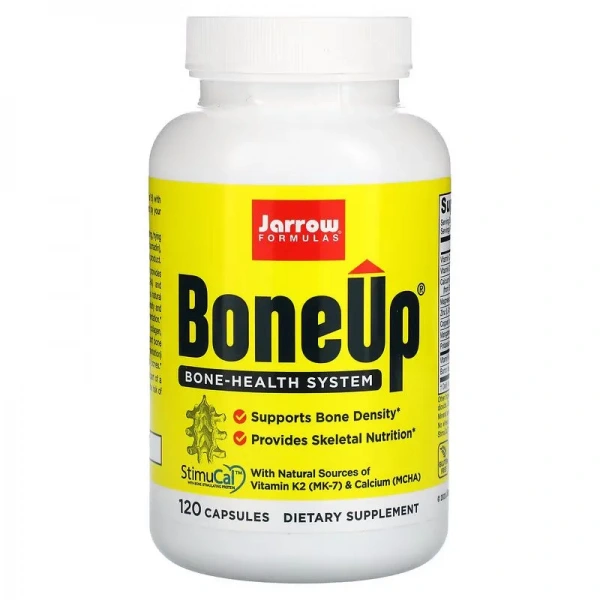
So remember to inform the specialist with whom you consult your results about other supplements you take, the dosage of vitamin D3 will depend on it if it turns out that it is insufficient in your body.
When it comes to products containing mainly vitamin D3, for example, Now Foods offers vitamin D combined with vitamin K2. One capsule contains 1000 units.
NOW FOODS Vitamin D-3 & K-2 - 120 capsules
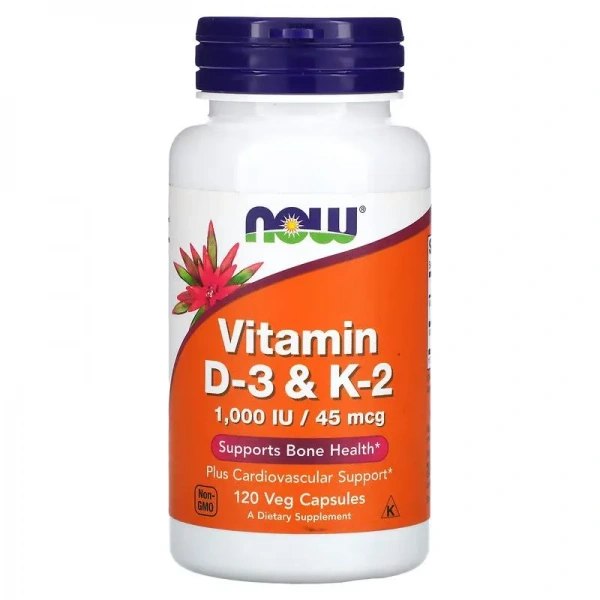
The same company also offers products for supplementation of larger deficiencies, such as a product in which one capsule contains 5,000 units
NOW FOODS Vitamin D-3 5000 IU - 120 capsules
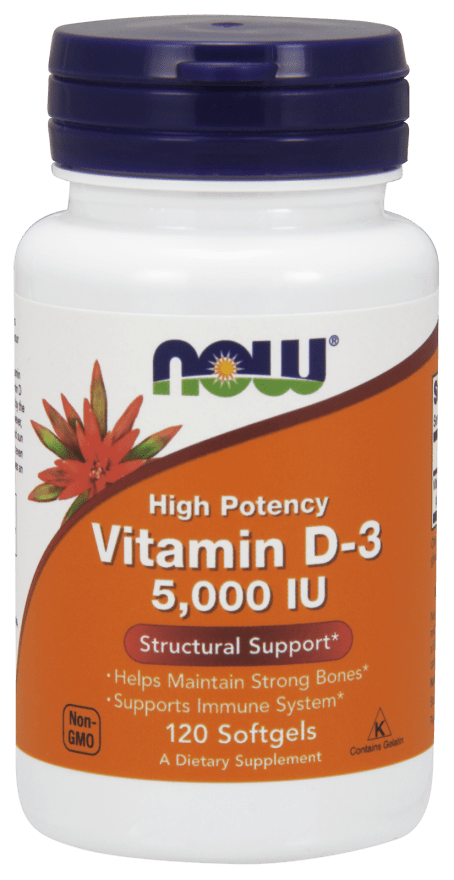
An alternative is the Doctor's best product where one capsule contains 5,000 units.
Doctor's Best Vitamin D3, 5000 IU - 360 capsules
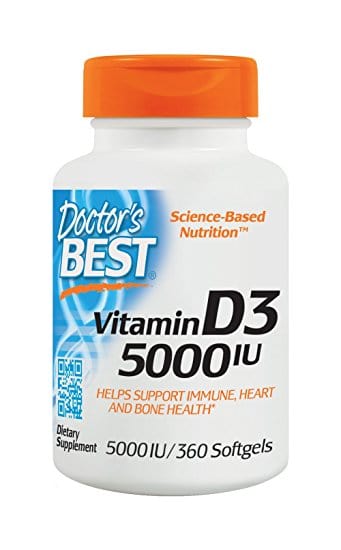
The best absorbable form are drops, e.g. SWANSON, where one drop contains 400 units.
SWANSON Vitamin D3 drops 400 IU (50 mcg) - 29.6 ml
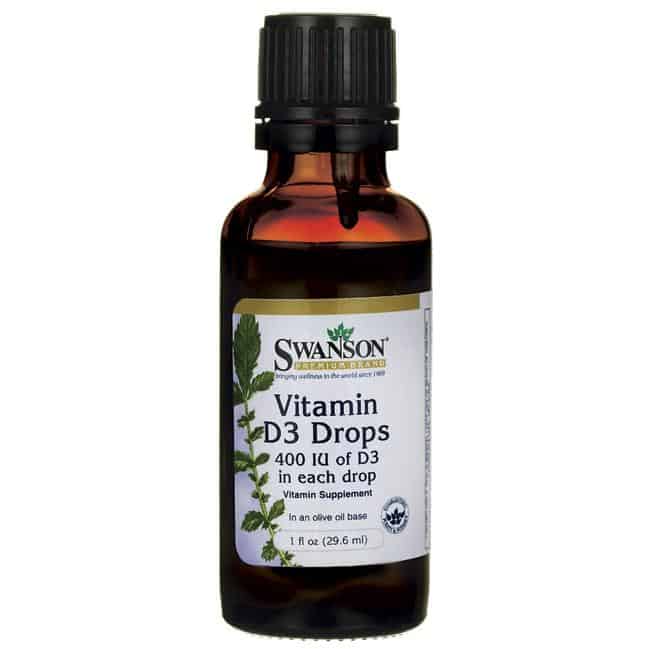
However, before choosing the right supplement, test your vitamin D level and consult a specialist.
Take advantage of the discount:
.png)
1. Vacek J, Vanga S, Good M et al.: Vitamin D deficiency and supplementation and relation to cardiovascular health. Am J Cardiol.2012; 109 (3): 359-63.
2. Wehr E,Pilz S, Boehm BO et al.: Association of vitamin D status with serum androgen levels in men. Clin Endocrinol (Oxf) 2010; 73 (2): 243-8.
3. Pilz S, Frisch S, Koertke H et al. Effect of vitamin D supplementation on testosterone levels in men. Horm Metab Res 2011; 43 (3): 223-5.
4. Ceglia L, Harris SS Vitamin D and its role in skeletal muscle. Calcif Tissue Int 2013; 92 (2): 151-62.
5. Chiang CM, Ismaeel A, Griffis RB, Weems S Effects of Vitamin D Supplementation on Muscle Strength in Athletes: A Systematic Review. J Strength Cond Res 2017; 31 (2): 566-574.
6. Soligard T, Steffen K, Palmer-Green D et al. Sports injuries and illnesses in the Sochi 2014 Olympic Winter Games. Br J Sports Med 2015; 49(7): 441-7.
7. Braegger C., Campoy C., Colomb V., Decsi T., Domellof M., Fewtrell M., Hojsak I., Mihatsch W., Molgaard C., Shamir R., Turck D., van Goudoever J. ; ESPGHAN Committee on Nutrition. J Pediatr Gastroenterol Nutr 2013 Jun; 56(6): 692-701.
8. Stolarczyk A.: Pediatric gastroenterology - questions and answers. Gastroenterologia Practical 2014, 1 (22), 72-74
Rate the text

Martyna Wiśniewska
As a dietitian, he helps in clinical diet therapy, helping not only to lose weight, but also to feel better in his body. In the office he sees patients whom he helps in: treatment of diet-dependent diseases such as diabetes, insulin resistance, hypertension, obesity, atherosclerosis, treatment of allergies and food intolerances, dietotherapy of diseases such as celiac disease, Hashimoto's disease, Crohn's disease, rheumatoid arthritis, thyroid disease. Patients who suffer from eating disorders, depression, sleep problems, have problems with chronic stress or simply would like to have more strength in life, can count on professional help
As a dietitian, he helps in clinical diet therapy, helping not only to lose weight, but also to feel better in his body. In the office he sees patients whom he helps in: treatment of diet-dependent diseases such as diabetes, insulin resistance, hypertension, obesity, atherosclerosis, treatment of allergies and food intolerances, dietotherapy of diseases such as celiac disease, Hashimoto's disease, Crohn's disease, rheumatoid arthritis, thyroid disease. Patients who suffer from eating disorders, depression, sleep problems, have problems with chronic stress or simply would like to have more strength in life, can count on professional help








